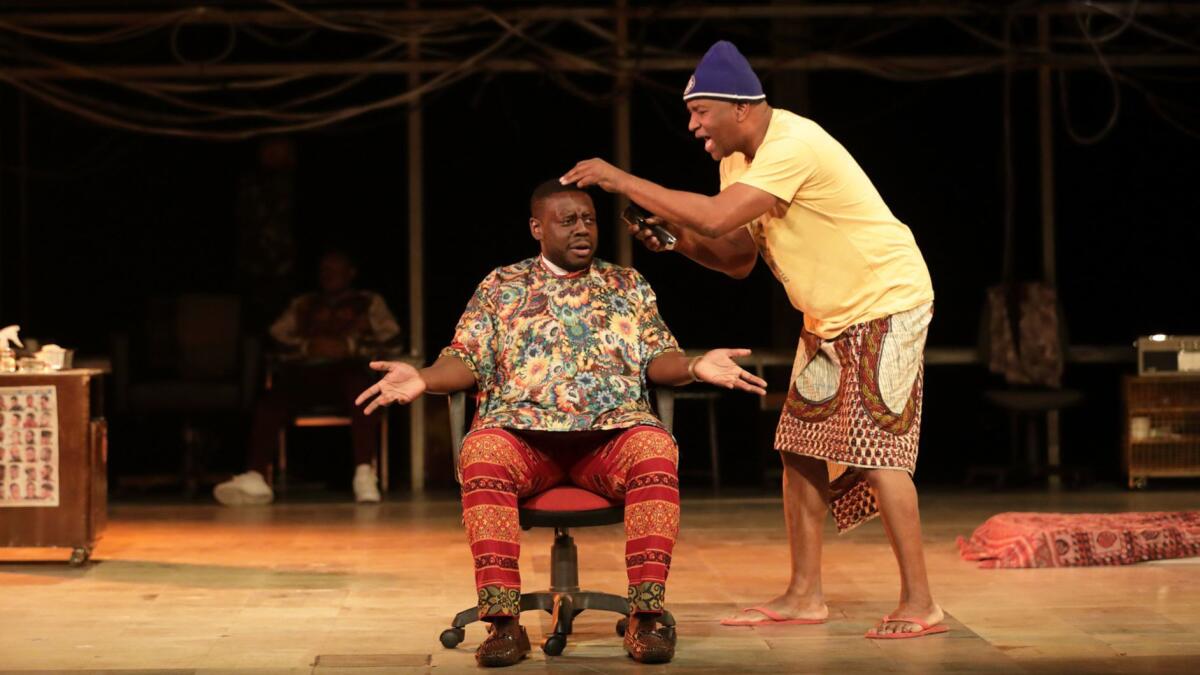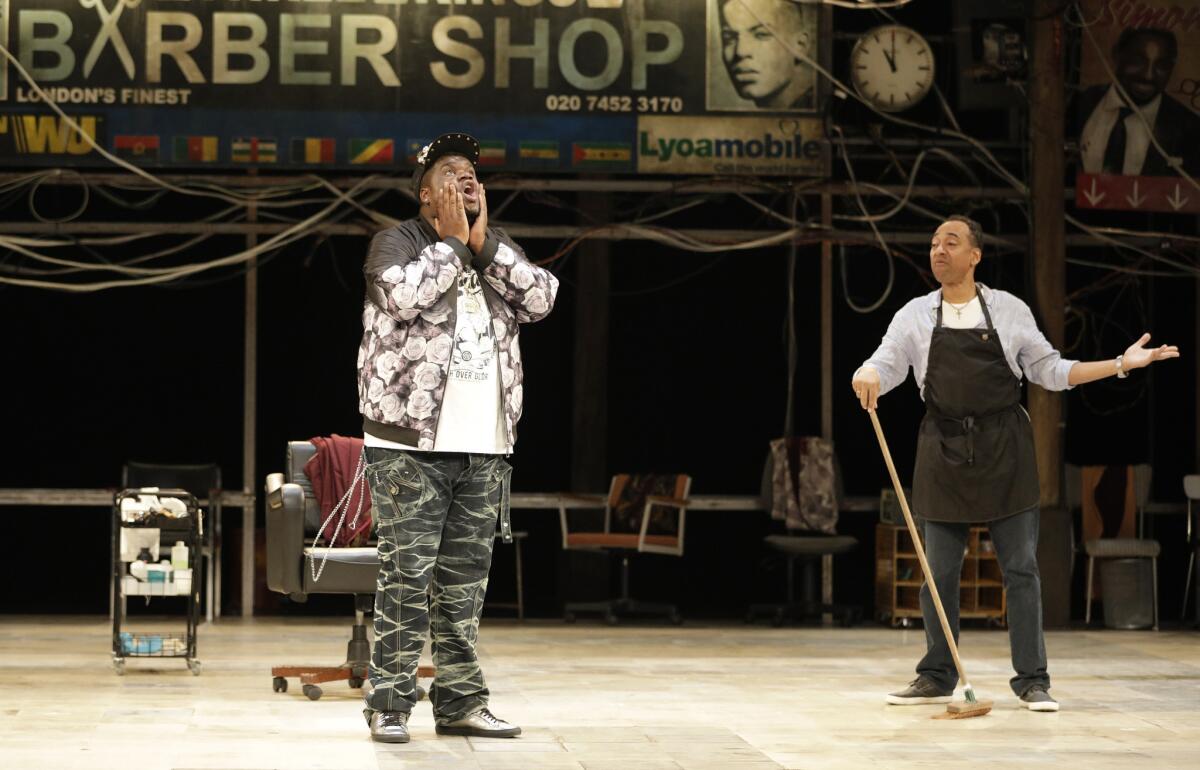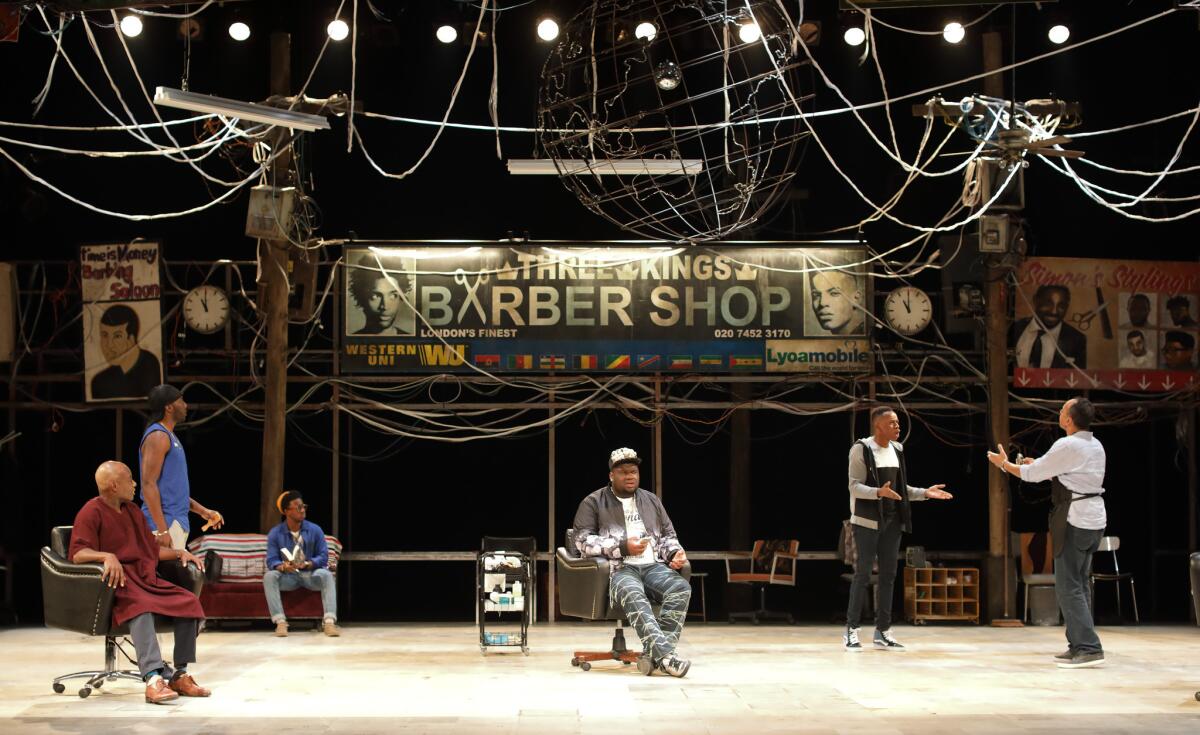Review: A shave and a haircut — and bonding time for African-heritage men in ‘Barber Shop Chronicles’ at Freud Playhouse

- Share via
“Barber Shop Chronicles” takes place in a series of barbershops, where men of African heritage gather for fellowship along with a trim in African countries still traumatized by colonialism or in swirling London, where the diaspora isn’t an abstract concept but a harsh, everyday reality.
Written by Inua Ellams, a Nigeria-born, London-based multidisciplinary artist who works as a poet, playwright, performer, graphic artist and designer, “Barber Shop Chronicles” offers a collage of character experiences organized thematically around post-colonial themes writ large.
These aren’t voices we hear from regularly, so the news they bring of trials and ragged triumphs is enlightening. But the play exists in some cloudy limbo between drama and pure performance.

A Fuel, National Theatre and West Yorkshire Playhouse co-production, the work arrives at the Freud Playhouse in this Center for the Art of Performance at UCLA presentation with enthusiastic reviews from abroad. But the nearly two-hour, intermission-less play is frustratingly diffuse and as a result often uninvolving.
The energy of the cast, under the direction of Bijan Sheibani, is unflagging. The lively stage presentation suggests an impromptu jam session or block party that’s moved indoors because of rain.
A globe spins from above, keeping Africa in view. Chairs on casters make for quick transitions among barbershops, which have their own attention-grabbing signs. Hip-hop erupts between scenes, inviting the actors to groove together in a physical language that links continents.
The play begins in Lagos, Nigeria, in the early morning hours before a barber shop shack operated by Tokunbo (Patrice Naiambana) is open for business. Wallace (Tuwaine Barrett), a young man desperate to make a good impression on his morning interview for a job as a driver, pleads for an appropriately “aerodynamic” haircut.
At a London barbershop, much of the talk revolves around the upcoming Chelsea-Barcelona soccer match. But the tension between Samuel (Elliot Edusah), a young barber whose father was once a partner in the business, and Emanuel (Anthony Ofoegbu), who is now the owner, has little to do with their being fans of different teams.
Samuel, like many of the characters in “Barber Shop Chronicles,” is forced to speculate about a father he doesn’t know all that well. In switching among African countries and London, Ellams attempts to reveal the geopolitical in the familial, dramatizing the ways these scattered sons of Africa are joined by a common historical suffering.
In South Africa, Simphiwe (also played by Naiambana) bemoans that Winnie Mandela was never made the leader of the country. Andile (Maynard Eziashi), his barber, argues that concessions “with the race thing” were necessary for the country to move forward.
But Simphiwe thunders in disagreement: “The fact we never got to deal with it manifests in violence; men who rape children, beat women. If criminals hijack a car, they slit the driver’s throat. We are still frustrated!”
That frustration simmers in London during debates about African masculinity and cultural assimilation. Ellams sensitively connects the failures of political leaders to the failures of fathers, but his characters get lost in the shuffle of important themes.
The drama tries to personalize social justice concerns, but the discursive nature of the playwriting undermines the effort. And when the dialogue (which isn’t always easy to understand because of accents and acoustics) becomes explanatory, a play with undeniable communal merit can seem a touch academic.

♦ ♦ ♦ ♦ ♦ ♦ ♦ ♦ ♦ ♦ ♦
‘Barber Shop Chronicles’
Where: Freud Playhouse Macgowan Hall, UCLA, 245 Charles E. Young Dr. East, L.A.
When: 8 p.m. Friday and Saturday. Ends Saturday
Tickets: $29–$59
Information: (310) 825-2101 or cap.ucla.edu
Running time: 1 hour, 55 minutes
Follow me @charlesmcnulty
More to Read
The biggest entertainment stories
Get our big stories about Hollywood, film, television, music, arts, culture and more right in your inbox as soon as they publish.
You may occasionally receive promotional content from the Los Angeles Times.











